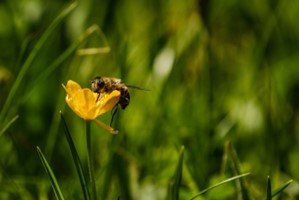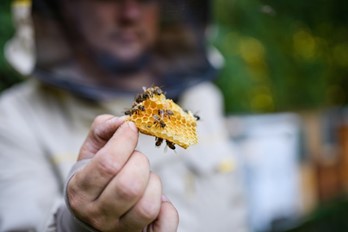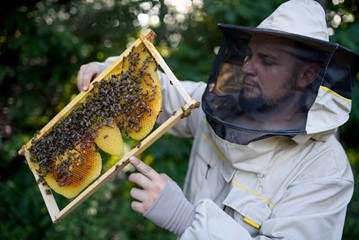Bees play a crucial role in agriculture through their pollination activities. Approximately one-third of the food we consume relies on pollination, primarily by bees. These industrious insects pollinate a variety of crops, including fruits, vegetables, nuts, and seeds. Without them, Tim Kealy explains that many of the foods we enjoy would become not just scarce but more expensive. Their pollination efforts are essential for maintaining biodiversity, supporting ecosystems, and ensuring the production of healthy crops.
How Pollination Works
Pollination is the process by which pollen is transferred from the male parts of a flower to the female parts, enabling fertilization and the production of seeds and fruit. Bees, attracted by the nectar and pollen, move from flower to flower, inadvertently carrying pollen with them. This cross-pollination not only helps plants reproduce but also enhances genetic diversity and increases crop yields. In commercial agriculture, bees are often transported to various fields to assist in the pollination of crops, a practice known as migratory beekeeping.
Challenges Facing Bees
Despite their importance, bee populations are facing significant threats. Pesticides, habitat loss, climate change, and diseases have contributed to a decline in numbers. Pesticides, particularly neonicotinoids, can be harmful to bees, affecting their navigation, foraging behavior, and reproductive health. Habitat loss due to urbanization and agricultural expansion reduces the availability of forage and nesting sites. Climate change can alter the blooming times of plants, disrupting the synchrony between pollinating insects and their food sources. Additionally, diseases and pests, such as the Varroa destructor mite, pose serious risks to bee health.
How to Keep a Healthy Hive
Given the critical role bees play in agriculture, maintaining healthy hives is essential. Here are some steps to ensure your hive thrives:
- Choosing the Right Location: Place your hive in a sunny spot that is sheltered from strong winds. Bees thrive in warm, dry conditions. Ensure there is a nearby water source and an abundance of flowering plants within a few miles.
- Providing Diverse Forage: Plant a variety of flowers that bloom at different times of the year to provide a continuous source of nectar and pollen. Native plants are particularly beneficial as they are well-suited to the local environment and support local bee populations.

- Avoiding Pesticides: Minimize or eliminate the use of pesticides in your garden. If necessary, choose bee-friendly options and apply them during times when bees are not active, such as early morning or late evening.
- Regular Hive Inspections: Inspect your hive regularly to monitor for signs of disease, pests, or other issues. Early detection and intervention are key to preventing problems from escalating.
- Managing Pests and Diseases: Familiarize yourself with common bee pests and diseases, such as Varroa mites, American foulbrood, and Nosema. Implement integrated pest management (IPM) strategies, which combine biological, cultural, and mechanical controls, to keep these threats in check.
- Providing Adequate Ventilation: Ensure your hive has proper ventilation to prevent moisture buildup, which can lead to mold and other issues. During hot weather, provide shade or ventilation to keep the hive cool.
- Supplementing Food: During times of scarcity, such as winter or early spring, supplement your bees’ diet with sugar syrup or pollen substitutes. This helps ensure they have enough resources to survive and thrive.

- Supporting Genetic Diversity: Consider introducing new queens or swapping frames with other beekeepers to enhance the genetic diversity of your hive. This can improve resilience to diseases and environmental changes.
- Practicing Ethical Beekeeping: Avoid over-harvesting honey and leave enough for your bees to sustain themselves. Ethical beekeeping practices prioritize the health and well-being of the hive.
Conclusion
Bees are indispensable to agriculture and the environment, playing a pivotal role in pollination and food production. By understanding their importance and taking proactive steps to maintain healthy hives, we can support bee populations and ensure the sustainability of our agricultural systems. Whether you are a hobbyist beekeeper or a commercial farmer, the health of your bees should be a top priority. By providing a supportive environment, managing pests and diseases, and practicing ethical beekeeping, you can contribute to the well-being of these vital pollinators and the ecosystems they support.
